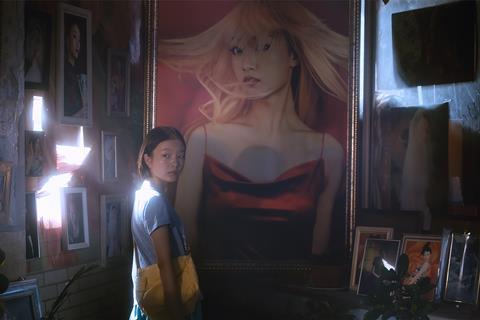Geng Zihan’s dreamlike debut offers a layered, fresh perspective in this Chinese coming-of-age drama

Dir: Geng Zihan. China. 2023. 92 mins.
Geng Zihan’s bittersweet debut feature A Song Sung Blue could easily be summarised as another wispy coming-of-age drama in which a young person’s life is forever changed by the events of one particular summer. Its slight narrative concerning the romantic yearnings of a teenage girl certainly fits neatly into that template, while hazy atmospherics bathe the proceedings in the anticipated pained nostalgia for the recent past. Yet this delicate affair lingers longer than one might expect, as Geng’s sensitive direction of Liu Yining’s nuanced screenplay imbues familiar tropes with a fresh perspective. It also benefits greatly from Zhou Meijun’s lead performance which provides a palpable undercurrent of ennui that is entirely in keeping with the melancholic title.
Creates an atmosphere that verges on the dreamlike
A Song Sung Blue, which premieres in the Director’s Fortnight selection at Cannes, is produced by Jane Zheng, whose credits include Cathy Yan’s first feature Dead Pigs (2018) which was belatedly distributed through MUBI. In terms of overseas prospects, Geng’s debut will likely take a similar path from the festival circuit to a high-end streaming platform. There is also domestic theatrical potential here, considering the enthusiasm demonstrated by local audiences for accessible independent titles when they are granted the opportunity to shine in the mainstream exhibition space.
Set in the northeast provincial capital of Harbin during the early 2010s, the film focuses on introverted 15-year-old Liu Xian (Zhou) whose divorced mother (Liang Jing) has accepted a posting in Africa to advance her medical career. As such, Liu is sent to live with her father (Liang Long), who runs a struggling photography studio. He’s also romantically involved with his Korean Chinese assistant (Liu Lianji) and playing stepfather to her assertive 18-year-old daughter Jin Mingmei (Huang Ziqi).
Introduced to Mingmei via her idol-like studio portrait, Liu Xian is inexorably drawn to the older girl who in turn lures her new friend out of her shell. Mingmei is taking a flight attendant course but aspires to open a shop, so Liu Xian endeavours to win her affections by raising the start-up funds in misguided fashion with minor consequences. Yet her feelings are only fleetingly reciprocated, as Mingmei is already adept at manipulating wealthy married men to shower her with fancy gifts.
The protagonist’s complex nature is established from the outset, with Liu Xian attending choir rehearsal where she is barely noticed by her fellow students or the instructor. When a shortage of female costumes is about prevent her from participating in the upcoming performance, however, she insists on wearing one of the male outfits instead. Zhou, who made her screen debut as one of the sexually abused schoolgirls in Vivian Qu’s seaside noir Angels Wear White (2017), takes this as the jumping off point for a layered portrait of a teenager who is socially withdrawn but independently minded and prone to acting on impulse. Her largely internalised performance is counterpointed by Huang’s strident turn as Mingmei, who proves to be every bit as complicated as her reserved admirer. Huang plays up Mingmei’s flair for performance, whether practicing her flight attendant walk or humouring male suitors, but also conveys signs of family trauma and a capacity for empathy.
Given that Liu Xian’s infatuation with Mingmei is so all-consuming, it’s perhaps appropriate that other relationships only receive passing attention. Although more scenes featuring her compassionate father (played with easy-going charm by Liang) would be welcome, the manner in which he drifts in and out of the incidental narrative makes sense within Geng’s encapsulation of memory. Still, his photography studio serves as a metaphor for Liu Xian’s summer experience. It is not only a place where memories are captured but an environment that encourages a lack of inhibition, as clients are coaxed into revealing their best selves.
The tasteful aesthetic by cinematographer Hao Jiayue is the complete opposite of the boldly cheerful portraits taken by Liu Xian’s father, which are characterised by tacky costumes and gaudy colours. Using various shades of blue and a flickering lighting scheme, Hao creates an atmosphere that verges on the dreamlike, particularly in the scenes that find Liu Xian and Mingmei sharing their frustrations in the sanctuary of the studio’s living quarters. This predominately cool palette emphasises Liu Xian’s isolation in tandem, while gently roving handheld camerawork works in tandem with deft editing by Matthieu Laclau and Tsai Yann-Shan to underscore her nervous curiosity. Location choices and Du Luxi’s production design make strong use of Harbin, a melting pot of ethnicities famed for its Russian influences, adding regional texture to a genuinely tender evocation of girlhood.
Production company: The Seventh Art Pictures
International Sales: Totem Films, hello@totem-films.com
Producer: Jane Zheng
Screenplay: Liu Yining
Cinematography: Hao Jiayue
Production design: Du Luxi
Editing: Matthieu Laclau, Tsai Yann-Shan
Music: Hank Lee
Cast: Zhou Meijun, Huang Ziqi, Liang Jing, Liang Long
























